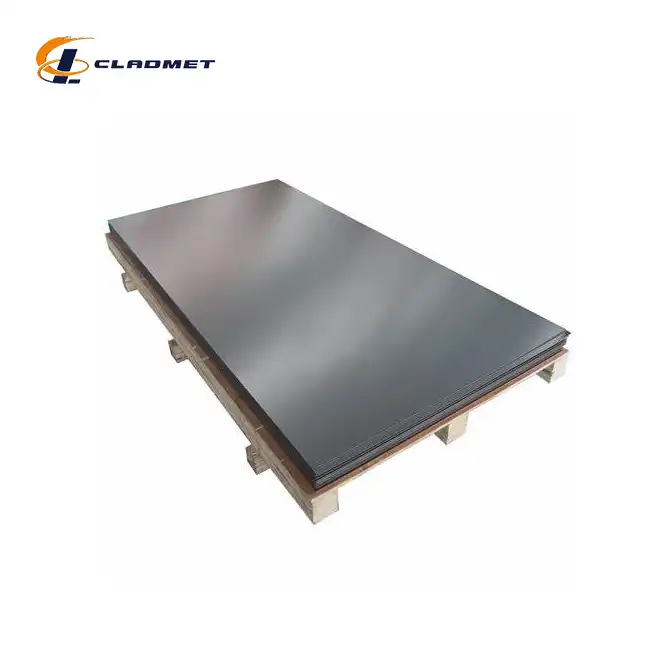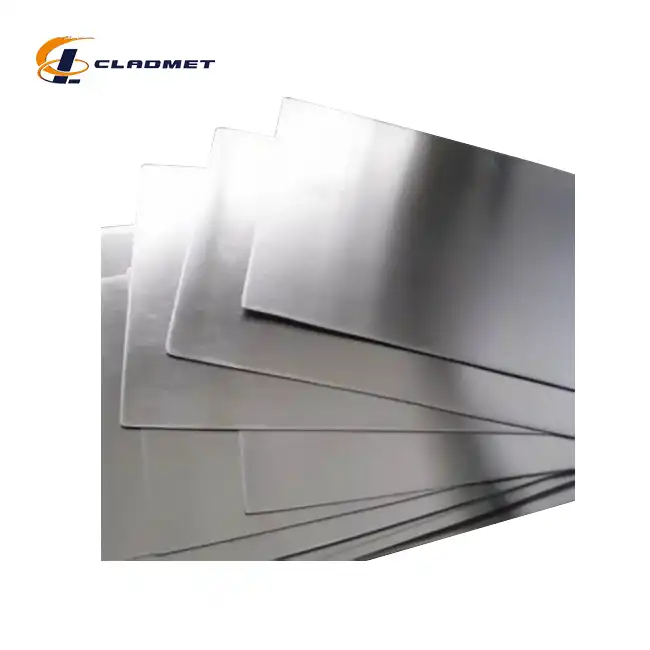How does the composition of 6Al-4V titanium affect its properties?
 2025-03-11 09:15:13
View:389
2025-03-11 09:15:13
View:389The composition of 6Al-4V titanium plays a crucial role in determining its exceptional mechanical, physical, and chemical properties. This remarkable titanium alloy, containing 6% aluminum and 4% vanadium, has become the most widely used titanium alloy worldwide, representing approximately 60% of all titanium alloy production. The specific concentration of alloying elements in 6Al-4V titanium sheet creates a unique microstructure that delivers an outstanding combination of strength, corrosion resistance, biocompatibility, and high-temperature performance. Understanding how these compositional elements influence the material's properties is essential for engineers and manufacturers who rely on this versatile alloy across aerospace, medical, automotive, and marine applications.
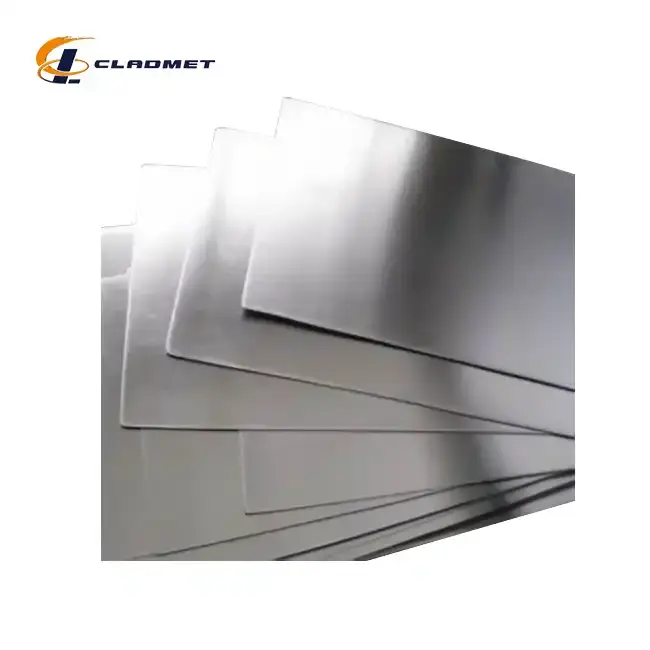
The Fundamental Role of Alloying Elements in 6Al-4V Titanium
Aluminum as an Alpha Stabilizer
Aluminum, comprising 6% of the 6Al-4V titanium sheet composition, serves as a primary alpha phase stabilizer. This critical alloying element strengthens the alloy by forming a solid solution with titanium, effectively increasing its strength-to-weight ratio compared to pure titanium. The alpha phase, characterized by a hexagonal close-packed (HCP) crystal structure, provides excellent creep resistance at elevated temperatures and contributes to the alloy's thermal stability. When manufacturing 6Al-4V titanium sheet, precisely controlling the aluminum content is essential as it directly influences the alloy's elastic modulus and tensile strength. The presence of aluminum also enhances oxidation resistance by forming a protective oxide layer on the surface, making the material particularly suitable for applications requiring exposure to oxidizing environments. This property is especially valuable in the aerospace sector, where components must withstand extreme conditions while maintaining structural integrity. Baoji JL Clad Metals Materials Co., Ltd. utilizes advanced processing techniques including hot and cold rolling to produce 6Al-4V titanium sheet with thicknesses ranging from 0.5mm to 100mm and widths of 100mm to 2000mm, ensuring precise control of the aluminum distribution throughout the material matrix.
Vanadium as a Beta Stabilizer
The addition of 4% vanadium to the 6Al-4V titanium alloy acts as a beta phase stabilizer, creating a microstructure with a balance of alpha and beta phases at room temperature. The beta phase, with its body-centered cubic (BCC) crystal structure, enhances the alloy's formability and heat treatment capabilities. This dual-phase microstructure is what gives 6Al-4V titanium sheet its remarkable combination of strength and workability. Vanadium's presence allows for greater hardenability through heat treatment processes, enabling manufacturers to tailor the mechanical properties to specific application requirements. The beta phase also contributes to improved ductility and fracture toughness compared to single-phase titanium alloys. In aerospace and automotive applications, this translates to better fatigue resistance and crack propagation resistance under cyclic loading conditions. The 6Al-4V titanium sheet produced by Baoji JL Clad Metals Materials adheres to rigorous industry standards including ASTM B265 and AMS 4911, ensuring consistent vanadium distribution throughout the material. This consistency is maintained through their production process, which involves both hot rolling for initial thickness reduction and cold rolling for superior surface finish and dimensional accuracy. Their quality control procedures include comprehensive chemical composition analysis to verify that vanadium content meets the specified 4% concentration with minimal variation.
Interstitial Elements and Their Impact
Beyond the primary alloying elements, the properties of 6Al-4V titanium sheet are significantly influenced by interstitial elements such as oxygen, nitrogen, carbon, and hydrogen. These elements, even in small quantities, can dramatically alter the mechanical and physical characteristics of the alloy. Oxygen and nitrogen typically strengthen the material but may reduce ductility when present in excessive amounts. Carbon can form titanium carbides that increase hardness but may create stress concentration points. Hydrogen, particularly detrimental in titanium alloys, can cause hydrogen embrittlement if not properly controlled during manufacturing. The production processes employed by Baoji JL Clad Metals Materials carefully manage these interstitial elements through controlled atmosphere melting and precise thermal treatments. Their manufacturing facilities, equipped with advanced testing equipment, monitor interstitial content throughout production to ensure the 6Al-4V titanium sheet maintains optimal performance characteristics. The company's rigorous quality control procedures, certified under ISO 9001:2000 and validated by PED and ABS international qualifications in 2024, verify that interstitial element concentrations remain within specified limits. This careful control allows their 6Al-4V titanium sheet products to deliver consistent performance in critical applications across medical implants, aerospace components, and marine environments where material integrity is paramount.
Microstructural Evolution and Property Relationships
Alpha-Beta Phase Balance
The distinctive properties of 6Al-4V titanium sheet stem from its carefully balanced alpha-beta microstructure, which results directly from its chemical composition. The ratio of alpha to beta phases, primarily controlled by the aluminum and vanadium content, determines many of the alloy's mechanical properties. A higher proportion of alpha phase increases strength and creep resistance, while a greater beta phase content enhances formability and hardenability. This microstructural balance can be further modified through thermomechanical processing, allowing manufacturers to tailor properties for specific applications. The standard 6Al-4V composition typically results in a microstructure containing approximately 90% alpha and 10% beta at room temperature, providing an optimal balance of strength and ductility for most applications. Baoji JL Clad Metals Materials maintains precise control over the alpha-beta phase balance in their 6Al-4V titanium sheet products through carefully regulated heating and cooling cycles during processing. Their production capabilities allow for sheets ranging from 0.5mm to 100mm in thickness, with widths from 100mm to 2000mm and customizable lengths to accommodate diverse customer requirements. This flexibility in dimensions, combined with microstructural control, enables the company to serve various industries including aerospace, medical, automotive, and marine sectors where specific property profiles are required. The company's products comply with international standards such as ASTM B265 and AMS 4911, ensuring consistent performance characteristics in these critical applications.
Grain Size and Morphology
The composition of 6Al-4V titanium directly influences the grain size and morphology that develop during processing, which in turn affect the mechanical properties of the final 6Al-4V titanium sheet. The presence of aluminum and vanadium creates a complex interplay during solidification and subsequent thermomechanical processing, resulting in characteristic grain structures. The size, shape, and orientation of these grains significantly impact strength, ductility, fatigue resistance, and creep behavior. Finer grain structures typically yield higher strength and improved fatigue performance, while coarser grains may offer better creep resistance at elevated temperatures. The morphology of the alpha and beta phases—whether lamellar, equiaxed, or bimodal—depends on both composition and processing history, providing another dimension for property control. Baoji JL Clad Metals Materials employs sophisticated hot and cold rolling techniques to manipulate the grain structure of their 6Al-4V titanium sheet products, achieving the optimal microstructure for specific application requirements. Their manufacturing processes include precisely controlled cooling rates and deformation parameters to develop the desired grain characteristics. This microstructural engineering results in 6Al-4V titanium sheet with exceptional mechanical properties suitable for demanding applications in aerospace structures, medical implants, automotive components, and marine equipment. The company's quality control procedures include metallographic examination to verify grain size and morphology meet specifications, ensuring consistent performance in the field.
Heat Treatment Response
The composition of 6Al-4V titanium, particularly its vanadium content, enables remarkable responsiveness to heat treatment processes, allowing further customization of properties for specific applications. The beta-stabilizing effect of vanadium permits various heat treatment protocols that can significantly alter the microstructure and resulting properties of 6Al-4V titanium sheet. Solution treatment followed by aging can increase strength through precipitation hardening mechanisms, while stress relief treatments can minimize residual stresses from manufacturing processes. Annealing treatments can enhance ductility when needed for forming operations. This heat treatment versatility stems directly from the alloy's composition and the resulting phase transformations that occur at different temperatures. The ability to manipulate properties through thermal processing makes 6Al-4V titanium sheet adaptable to diverse application requirements. Baoji JL Clad Metals Materials offers various heat treatment options for their 6Al-4V titanium sheet products, enabling customization to meet specific customer needs. Their facilities include controlled atmosphere furnaces capable of precise temperature regulation to achieve desired microstructural transformations. The company's technical expertise in heat treatment protocols allows them to deliver 6Al-4V titanium sheet with optimized property profiles for applications ranging from aerospace structural components to medical implants. Their quality assurance processes, certified under ISO 9001:2000 and validated by PED and ABS international qualifications in 2024, include comprehensive testing of heat-treated materials to verify mechanical properties meet specified requirements across their product range, which spans thicknesses from 0.5mm to 100mm.
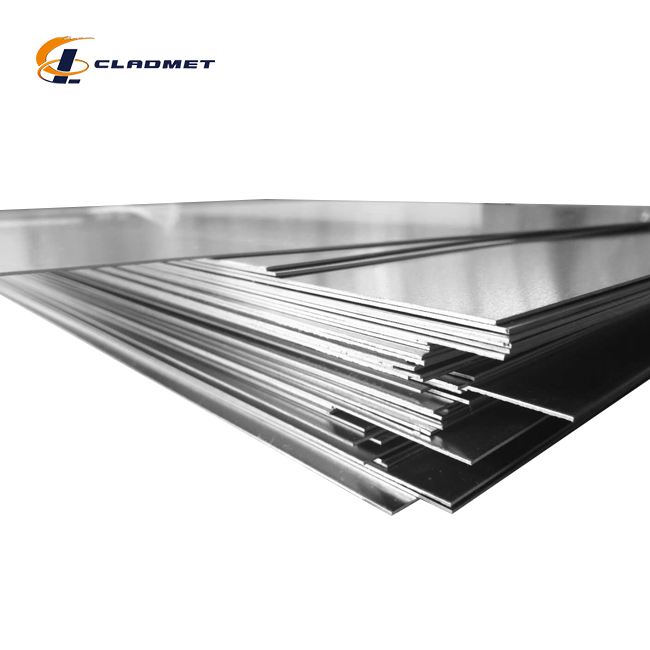
Application-Specific Property Enhancements
Mechanical Property Optimization
The composition of 6Al-4V titanium can be fine-tuned to optimize mechanical properties for specific applications, making it one of the most versatile structural materials available. The 6% aluminum and 4% vanadium formulation creates an excellent baseline of properties, including a typical tensile strength of approximately 900-1200 MPa and yield strength of 800-1100 MPa, combined with good ductility and fracture toughness. This exceptional strength-to-weight ratio makes 6Al-4V titanium sheet particularly valuable in weight-sensitive applications. Minor compositional adjustments and processing variations can further enhance specific properties such as fatigue resistance, fracture toughness, or creep resistance when required for specialized applications. The mechanical properties of 6Al-4V titanium sheet are also remarkably consistent across a wide temperature range, maintaining structural integrity in both cryogenic and elevated temperature environments. Baoji JL Clad Metals Materials employs precise composition control and advanced processing techniques to produce 6Al-4V titanium sheet with optimized mechanical properties. Their manufacturing capabilities include both hot rolling for primary thickness reduction and cold rolling for superior surface finish and dimensional accuracy. The company's products, available in thicknesses from 0.5mm to 100mm and widths from 100mm to 2000mm, undergo rigorous testing to verify mechanical properties meet or exceed industry standards such as ASTM B265 and AMS 4911. This testing includes tensile testing, hardness measurement, and impact testing to ensure consistent performance in critical applications across aerospace, medical, automotive, and marine sectors.
Corrosion Resistance Enhancement
The exceptional corrosion resistance of 6Al-4V titanium derives directly from its chemical composition and the stable, protective oxide layer that forms on its surface. The presence of aluminum enhances this natural passivation process, creating an extremely durable barrier against corrosive environments. This inherent corrosion resistance makes 6Al-4V titanium sheet invaluable in applications exposed to marine environments, chemical processing facilities, and biological systems. The alloy exhibits excellent resistance to pitting, crevice corrosion, stress corrosion cracking, and general corrosion across a wide range of environments, including salt water, most organic chemicals, and many acids. This superior corrosion performance translates to extended service life and reduced maintenance requirements compared to many other structural metals. Baoji JL Clad Metals Materials leverages this inherent corrosion resistance in their 6Al-4V titanium sheet products, which find applications in marine components, chemical processing equipment, and offshore structures. Their manufacturing processes, certified under ISO 9001:2000 and validated by PED and ABS international qualifications in 2024, include surface treatments that optimize the protective oxide layer for specific operating environments. The company's quality control procedures include corrosion testing to verify performance in simulated service conditions, ensuring their 6Al-4V titanium sheet products provide the expected corrosion protection throughout their operational lifespan. This testing, combined with strict adherence to material composition specifications, delivers products that maintain structural integrity even in highly aggressive environments.
Biocompatibility for Medical Applications
The specific composition of 6Al-4V titanium creates exceptional biocompatibility properties that have revolutionized medical implant technology. The combination of titanium's inherent biocompatibility with the mechanical advantages provided by aluminum and vanadium results in a material ideally suited for long-term implantation in the human body. The 6Al-4V titanium sheet exhibits minimal tissue reaction, excellent osseointegration capabilities, and remarkable resistance to biocorrosion in physiological environments. These properties stem directly from the material's composition and the stable oxide layer that forms on its surface, which prevents ion release into surrounding tissues. Additionally, the elastic modulus of 6Al-4V titanium, while higher than human bone, is significantly lower than that of alternative implant materials such as stainless steel or cobalt-chrome alloys, reducing the risk of stress shielding in orthopedic applications. The alloy's strength enables the production of smaller, less invasive implant designs while maintaining structural reliability. Baoji JL Clad Metals Materials produces medical-grade 6Al-4V titanium sheet that adheres to stringent purity requirements for biomedical applications. Their manufacturing processes include specialized cleaning and passivation protocols to optimize surface properties for medical use. The company's 6Al-4V titanium sheet products undergo comprehensive testing for biocompatibility, including analysis of surface chemistry and potential leachable compounds, ensuring they meet international standards for medical implant materials. Their production capabilities, spanning thicknesses from 0.5mm to 100mm, enable the fabrication of various medical devices from large orthopedic implants to delicate components for minimally invasive surgical instruments, all with the consistent performance characteristics required for critical medical applications.
Conclusion
The precise balance of 6% aluminum and 4% vanadium in 6Al-4V titanium creates a remarkable material with optimized strength, durability, and versatility. This composition results in an ideal alpha-beta microstructure that delivers exceptional mechanical properties, corrosion resistance, and biocompatibility, making 6Al-4V titanium sheet indispensable across aerospace, medical, and industrial applications worldwide.
Looking to enhance your next project with premium 6Al-4V titanium sheet? At Baoji JL Clad Metals Materials Co., Ltd., we combine cutting-edge explosive composite technology with innovative rolling processes to deliver superior materials tailored to your exact specifications. Our products meet the highest international standards, having passed ISO9001-2000 certification and recently secured PED and ABS international qualifications in 2024. Whether you need standard sizes or custom solutions, our expert team provides comprehensive OEM/ODM services and ongoing R&D support to meet your unique challenges. Contact us today at sales@cladmet.com to discover how our advanced titanium solutions can elevate your manufacturing capabilities.
References
1. Donachie, M.J. (2000). Titanium: A Technical Guide. ASM International, Materials Park, OH.
2. Leyens, C., & Peters, M. (2003). Titanium and Titanium Alloys: Fundamentals and Applications. Wiley-VCH, Weinheim.
3. Lütjering, G., & Williams, J.C. (2007). Titanium (Engineering Materials and Processes). Springer-Verlag, Berlin.
4. Boyer, R., Welsch, G., & Collings, E.W. (1994). Materials Properties Handbook: Titanium Alloys. ASM International, Materials Park, OH.
5. Froes, F.H. (2015). Titanium: Physical Metallurgy, Processing, and Applications. ASM International, Materials Park, OH.
6. Banerjee, D., & Williams, J.C. (2013). Perspectives on Titanium Science and Technology. Acta Materialia, 61(3), 844-879.

_1737007724117.webp)
_1736996330512.webp)









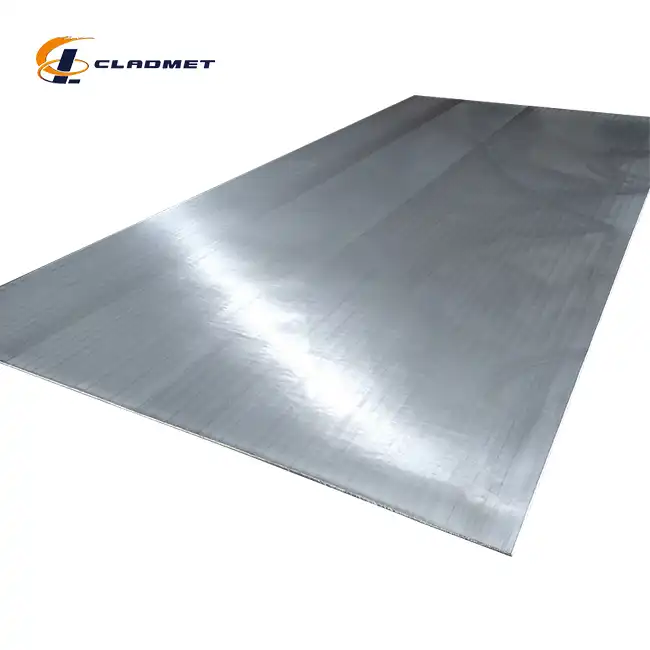
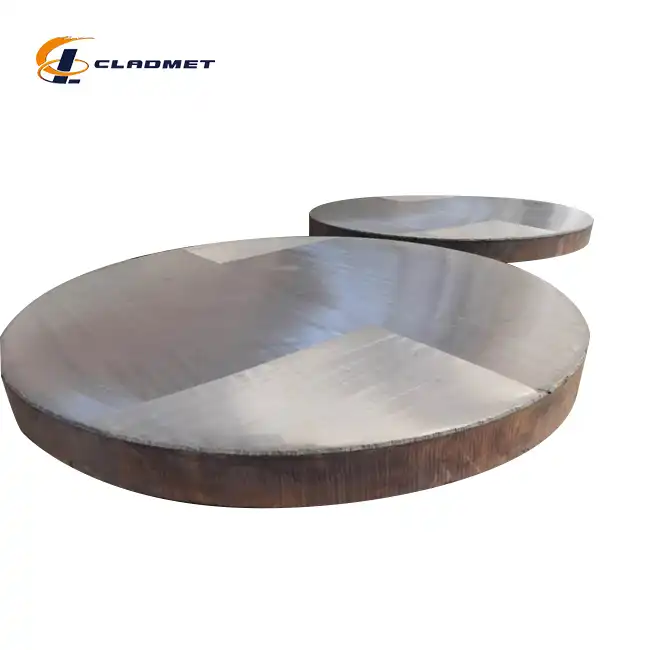
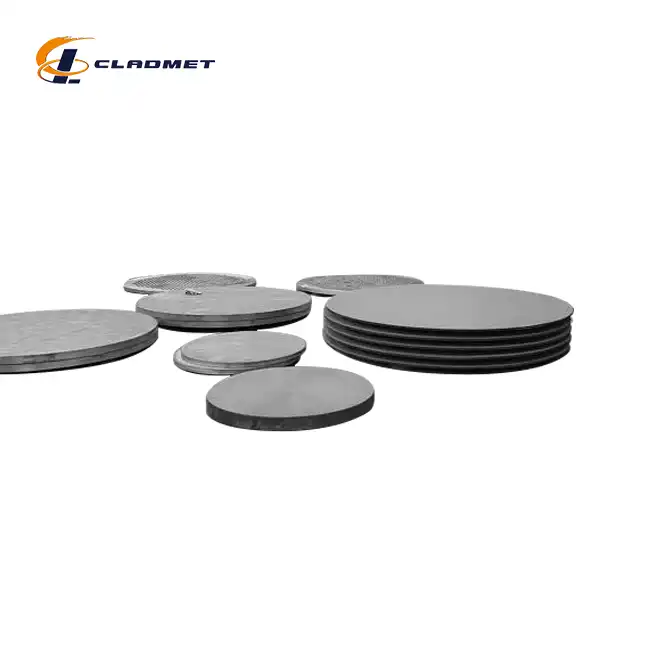
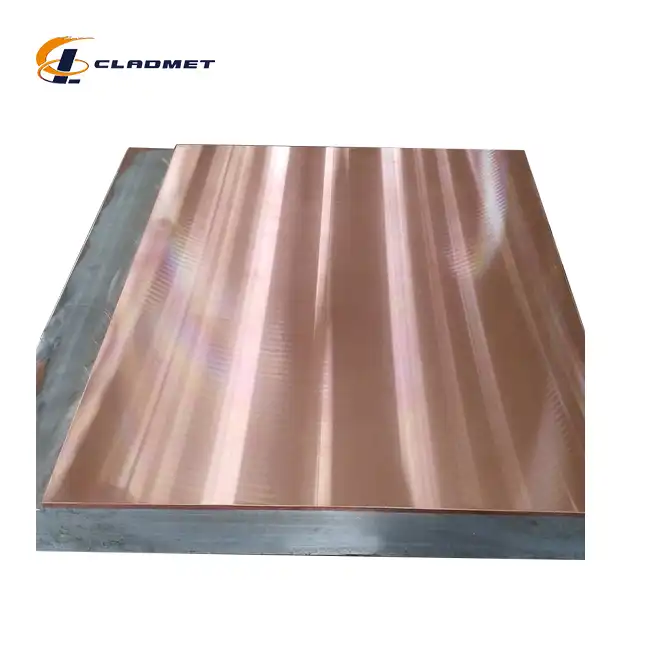
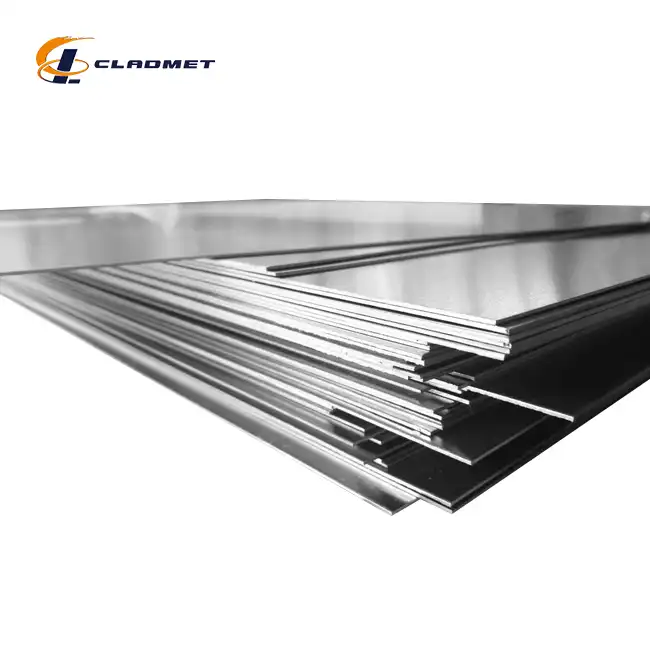
_1737611948854.webp)
